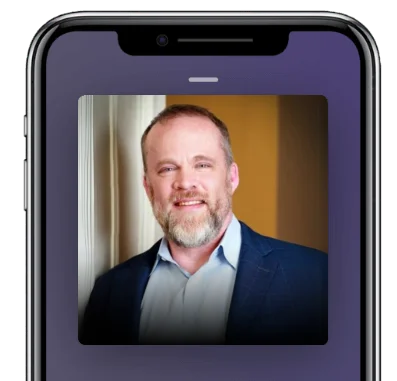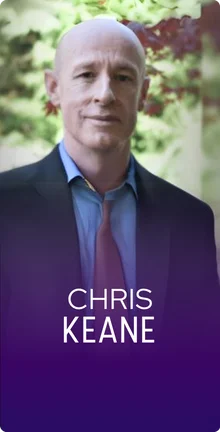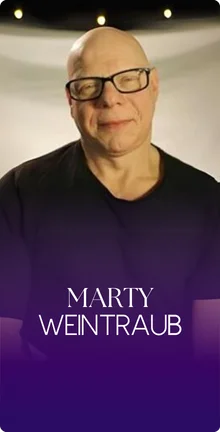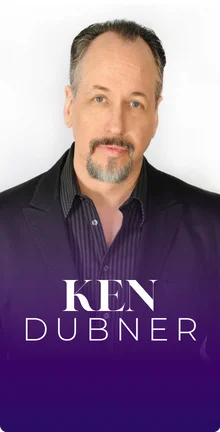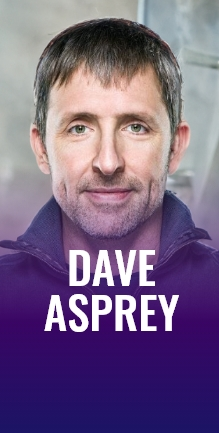Great to have you on the show, Ron.
Hey, it’s great to be on the show with you. I always learn so much from you whether it’s learning about SEO when we met or just right now learning about my own microphone. I always learned from you so I’m looking forward to what I’m going to learn from you this hour while I’m talking to you about what I do.
That’s awesome. Ron, you had just such a great style of presenting, not only did you convey very useful information to the audience, you did it in a way that was entertaining. Did you learn stand-up comedy or something like improv? How are you so good on stage?
I appreciate that. Honestly, I think that’s one of the best compliments somebody could give me. I really appreciate you saying that because I think that’s what I like to say that maybe differentiates me in my field is just the fondness that I try to have when I present it. But people always say when they’re talking to me that I used to hold the record for the fastest to memorize a deck of cards, these other memory records, and then they’ll always say, “Do you have some natural ability?” I’ll say, “I do not have a natural ability. My memory is equal to yours. There’s no difference at all. If there is any gift or natural ability I have, it’s in the fun way that I can present it. I will accept that as a natural ability.”
But I will also say that it’s a lot of hard work. The presentation you saw me give, I’ve been giving that for 28 years now and I’ve probably given it nearly 2000 times. You go and you give the presentation. You say something that somebody laughs and you’re like, “Oh, I’m going to keep that in.” Then the next time, you add it in and then it just becomes a highlight reel of your best jokes.
That makes a lot of sense. I do a bit of that myself. I wait for the audience’s reaction, then it goes up here, and filed away for next time if it landed well. You have an approach where you teach folks and get them to practice using their memory. Is it 1 hour a day, 10 minutes a day, 5 minutes a day? What’s the necessary amount of practice that would really make you world-class in your memory, or at least, better than anybody else you knew, for our listeners who are curious about becoming better at remembering people’s names or remembering funny jokes and that stuff?
You don't have a bad memory. Your memory is a million times better than you think it is. Share on XI think regarding it to memory, the work is almost all front-loaded. What I mean by that is the first two to three days, the first week, you’re actually going to have to take time to learn the system, to learn how your mind memorizes and operates. That first week, you’re going to spend more time than you would spend in any other week for the rest of your life devoted to the memory systems.
But once you have an understanding and you know how it works, then it just becomes maintenance. It doesn’t necessarily have to be you’re going to sit down and dedicate 10 minutes, it could just be as you go throughout your day. The language of our memory pictures. The biggest obstacle you will have in getting faster and better with your memory is creating pictures or images for things that you want to remember.
For example, names. You meet somebody named Lisa. You think, “Oh, my gosh, what’s a good picture to remember that name Lisa? Oh, I’ll think of the Mona Lisa, the painting.” Every time you come across somebody, if you could just go through that thought process, that’s the maintenance you’ll have to go through with improving your memory. To answer your question, the first week, a little bit of work, not going to lie. After that, just as you go throughout your normal day, 10 minutes a day.
You gave the Mona Lisa as an example of a way to remember the name Lisa. How would that be for the name Lisa, not for the name Mona?
Correct. That’s a great point. Every name needs a distinctive picture. For the name Mona, I might see somebody in pain and they’re moaning. Here’s good at expanding on that. The name David, I use a divot. When you make a hole in the ground when you golf, it’s a divot. For me, David is a divot. I needed a distinction. Dave is a cave. There’s a distinction between different versions of the same names.
Here’s how you make that. Every Lisa, if you determine it’s going to be the Mona Lisa, every Lisa from now on for the rest of your life has to be the Mona Lisa. If you determine Mona as somebody in pain, moaning, then every Mona has to be that picture. That’s how you keep from getting confused. You don’t change the picture based on the person.
Got it. I remember one of the people you brought up from the audience, and we were supposed to memorize everybody’s names, he had a mustache. You had something coming out of his mustache, was it money, bills, or something? It might have been bills. Does this ring a bell, the guy was named Bill?
His name was Bill. If I had dollar bill shooting out of it, certainly was, his name was Bill so I had dollar bills shooting out of his mustache. Here’s why, when you want to remember something, let’s take a name, for example, the first thing that you do is you look at their face, you observe their face, and you pick out something unique on their face. For example, the unique feature on his face was the mustache. Once you’ve zoned in on that unique feature, the next thing you do is you turn their name into a picture.
Let’s just say that, it’s going to be crazy, but let’s say his name was Lisa, we’ve already determined the picture for the Mona Lisa so we would put the Mona Lisa on that mustache which is that’s crazy, it doesn’t make sense but you get the idea. Since his name is Bill, we see dollar bills coming out of the mustache.
Here’s the point I’m hoping to make. Whatever the distinctive feature is on that person’s face, that’s where we imagine the picture. Since his unique feature was his mustache, we put the dollar bills on his mustache with a lot of action. Now here’s the trick to this, the trick is the next time you see that person, you don’t try to ask yourself what was their name. You ask yourself, “What stood out to me about their face? Oh, yeah, it was his mustache. Now, what was going on his mustache? Oh, dollar bills were coming out.” That leads you to the name Bill.
You’re not a memory champion, to best of my knowledge, you’re very intelligent, you’re very smart, you have a good memory but you haven’t competed in memory tournaments. If you have, I haven’t seen you in the hallways, but six-seven months later, “Hey, remember that guy we imagine dollar bills flying out of his mustache?”
I can’t believe actually that I remembered his name was Bill. I remembered his mustache, I remembered something coming out, and then I thought his name was Bill. That’s pretty cool. Awesome.
That’s the progress that we try to go through with everybody.
You use the dollar bills for Bill every time so that if it’s money shooting out, it’s not some other name, it’s always Bill?
Correct. If it’s money coming out, it’s always Bill. Now, for the woman’s name Penny, I use a penny like quarters, nickels, dimes, a penny. So that would be more like a slot machine, pennies just going out. Maybe, let’s say Penny has pretty eyes, the pennies would be falling out of her eyes. That is the idea behind the memory system. You have a picture for every common name and you see that picture.
That’s the hardest part. Everybody listening to this right now or watching this right now, they’re going to get out there, they’re going to try to practice it, tomorrow they’re going to meet somebody, they’re going to try to turn that name into a picture, and then they’re going to realize they’re not listening to the conversation, that they’re going to get bogged down, they’re just going to give up, and they’re going to say, “Oh, it’s not worth it.”

Initially, it’s a little bit cumbersome. You probably won’t be able to think of these pictures while you’re talking to the people because you’re new to it. My suggestion to you is this, after the conversation is over, when you’re driving home or walking home, then ask yourself what’s a picture for that name. Over time, you’ll get a lot better and a lot faster at it where you can do it on the spot.
You mentioned during your presentation that as you’re walking up to the person to introduce yourself and hear their name, you’re already identifying the feature that you’re going to connect with their name. As soon as you hear that name, you are going to associate that image with that feature so you’re ready to go.
Absolutely. A lot of times, when I speak for an audience where there are 100, 200, 300 people in the audience, before I even get a chance to meet them, I’ll just be at the back of the room looking at the audience and I’d be like, “Oh, that guy, I’m going to use his hairline. Oh, that guy, I’m going to use his beard. That lady, I’m going to use her eyes,” or something like that.
Even in a large-scale audience, I’m picking out the distinctive features before I meet them and as I’m walking towards them. I certainly do that. Then I zone in, maybe a guy’s walking towards me and he’s got big ears. As he’s walking towards me, I’m just thinking, “Okay, his ear stands out to me.” Then I’d say, “Hey, my name’s Ron, what’s your name?” He says, “Oh, my name’s Steve.” The picture for me for Steve is a stove. I then imagined that stove cooking his ears, what was standing out to me.
That’s awesome. The more fanciful out there the imagery is, the easier it is to remember it, right?
It is, and that’s something I’ve been saying for a long time. It’s not something I came up with and to reinforce that point, I was reading a book. It’s by Cicero, he lived 2000 years ago. He had a part in this book where he talks about memory training. He was saying, “The brighter you can make the objects, the more outlandish,” and he even used the word grotesque, the more grotesque or emotional you can use it, the more it’s going to mean to your memory.
To me, reading that book was just so cool. I’m like, “Oh, my God. This is what I’ve been saying,” and not that I came up with it because I knew I didn’t come up with it, but that somebody 2000 years ago had the exact same thought process, vivid, emotional, colorful. He was using this to give speeches or presentations. He was a Roman politician in the Roman Senate.
So cool. Do you have a favorite story you want to share about how you were able to use this memory technique for names, specifically, to get a big business deal or to have something pretty remarkable happen just because you were able to remember their name months or years later?
I have formed a lot of relationships because of remembering names and faces. I got a speaking engagement for Mary Kay Cosmetics, which is a big company. They were founded here in Dallas.
One day, back in 2004, I met a woman. I used to have a public seminar. I still do but they’re rare. But I had this public seminar and I had a deal. If you signed up for it, you could bring your kids for free. I was really just getting parents to sign up for it and bring their 12- or 13-year-old kids for free.
This woman came up to me and said, “Ron, my son is 42. Can he come for free?” I thought, “Yeah.” I looked at her name tag, it said, “Reena.” I said, “Reena, for you, anything.” I didn’t know who Reena was but I wanted her to sign up and I didn’t care how old her son was. She signed up and before the seminar happened, I saw her at a different event a couple of months later or a couple of weeks later. I said, “Reena, how are you doing?” She’s like, “Oh, my gosh, I can’t believe you remembered my name. You remembered my name.” She was a retired-age woman.
She called me on the phone a couple of days later at my office and she said, “Ron, I got a group I want you to speak for. I was impressed that you remembered my name, will you speak for them?” She was not retired but she was retired age and I just thought, “Oh, my gosh. It’s probably going to be some Rotary Club or some small meeting at a pancake house in the back room, they got four people there.” I said, “Reena, if I have it available, I’ll do it. What’s the date?” She told me the date. I said, “I have it available. Where is it at?” She said, “The Grapevine Convention Center,” which here, that’s in between Dallas and Fort Worth. It’s a pretty sizable building.
I said, “Reena,” I was shocked that she was asking me to speak there. I said, “Do you have one of the small rooms there rented out?” She said, “No, we got the biggest banquet room rented out.” I said, “What group is this?” She said, “This is Mary Kay Cosmetics.” Turns out Reena was one of the founders of this company back in the 70s. When I got up on that stage that day, I gave my speech, she came over, and she put her arm around me.
At the end of my speech, she said, “Ladies, this is Ron White. He is my friend. I want you all to sign up for his memory course.” I was like, “What?” But to answer your question, how did I become her friend? I remembered her name. I didn’t remember her name because I thought she was a rich and powerful woman which she turned out to be. I remembered her name because she was just a person and I wanted to give her the respect to remember her name. That’s a true story of somebody that I remembered, was impressed with me remembering their name, and led to business.
I’ll tell you this at this point and go back to you. Most of the time, the most meaningful thing to me is it leads to a lot of friendships and it makes people feel good. I’ve really made a point in 2020 to remember 200 new people. I don’t mean at a conference, memorize 200 names, then get offstage, and forget about them because I don’t see them in 6 months. I mean 200 people that I really know that I could see at any point and remember their name. Just in the last couple of weeks, I’ve made so many good friends because of that. That’s equally as important to me.
They say that the sweetest sound to a person is the sound of their name. I used to believe that I was really bad at remembering names. I thought first of all that my whole memory was getting worse as I was getting older, that becomes a self-fulfilling prophecy when you believe that. It was getting worse because I thought it was getting worse. Then I came to this distinction with the help of my friend, Amy Africa, she told me about memory gadgets and how there are different parts of the brain that store different types of memories.
Never stop engaging and improving your brain. This is how you progress in everything. Share on XNumbers, for example, are in a different memory gadget than pictures, which was obvious when you think about it, that’s the visual cortex, etc. But the idea that there were these nine different memory gadgets in the brain and that I still had a fantastic memory for numbers. It empowered me and changed my perspective. It allowed me to see my strengths instead of weaknesses. Then I changed my belief system around my memory. I also got this different distinction that not only is that the sweetest sound to hear your own name, but it’s also disrespectful to not remember somebody’s name.
The flip side is I was disrespecting people by not taking the time and the focus to remember their names. I didn’t want to do that. I’m an empathic, caring person. Those two things combined allowed me to reset my expectations around people’s names. I am quite good now at remembering names. Now, I haven’t been using your technique, I really should be, except in the case of Bill, that’s funny. I loved your talk and I wanted to have you on the podcast. I just filed that away without practicing. That’s the key.
Practice doesn’t make perfect, practice makes permanent. I wasn’t making permanent this new skill that I had learned from you so that I could remember people’s names even better. In this case, seven months later, I can still remember that guy’s name. I think this really underlines the importance of practicing but also just changing your mindset about who you are, your beliefs, and not set yourself up for failure but to cut yourself some slack.
You know what, that’s so true. There are a lot of things you said there that were so great. One of them was you’re getting better at remembering names and you’re not necessarily using a memory system, but what you’re doing is you’re focusing on it and you’re paying attention. That’s such a big part of the memory.
A lot of times, when you don’t remember a name, it’s not because you got a bad memory, it’s just you’re not focused on it, you’re not paying attention. They say what their name is and you’re thinking about all this other stuff in your brain, you never even hear their name. You walk away from the conversation, you realize, “You know what, I did not even hear their name? I didn’t even listen when they said their name.” That is the biggest obstacle. Even though you’re not maybe implementing a memory system right now, you’re focusing, and that’s a huge step for memory.
Really cool. I just realized this also at the Strategic Coach mastermind a couple of days ago. I was thinking, “Do I remember the guys that I sat across from?” Heck, yeah, I do. I remember Aaron and Chad. That just goes to show that it’s in there. It’s captured. Pretty cool.
Now, you aren’t born with this skill, what was it that started you on this journey of becoming a memory champion and teaching others this technique? You must have an origin story that’s pretty interesting here.
I’m 46 years old now, I’ll be 47 in June. When I was 18 years old, we’re going to be 29 years old this June, I was a telemarketer for a company that cleans chimneys back in 1991. I was calling up people all day long, “Can we come and clean your chimney? Can we clean your chimney?” One day, I called this guy and I said, “Can we clean your chimney?” He said, “We don’t want our chimney cleaned. We’re trying to sell our house. Thanks for calling.” As he was hanging up the phone, I said the words that changed my life. I said, “Sir, don’t hang up the phone. If you’re trying to sell your house, you need a clean chimney.”
He laughed. He said, “That’s ridiculous, but I do need a good salesman. Do you want to go to work for me? I sell memory training seminars. I’ll pay you more than you’re making now,” which was a pretty safe gamble on his end. I went to work for him almost the next day, that was the summer of 1991, and I went to work for him as a telemarketer. I got the business people on the idea of how better memory would improve the business. At that point, I had never even taken a memory seminar. I probably worked for him for six weeks before I ever took an actual memory seminar, self-experience in the product myself.
Then I experienced the product in August of 1991. You know what? I was amazed with it but I was more seeing it as a business. I think for the next 10 years, maybe 8–9 years, I just focused on the business aspect of selling seminars. Then probably around 2001 or 2002, I decided that I wanted to be a guy who was known as a memory champion, a memory expert. I set out to win records, set records, do these crazy memory stunts. That’s really where my business evolved from a guy who sold memory courses to a guy who did the stunts and that kind of stuff.
Give me an example of a stunt or two that got you some world records, or got you on Good Morning America, or whatever.
Winning the USA Memory Championship in 2009 and 2010 and setting the record for the fastest to memorize a deck of cards, that was one. They shuffle up a deck of cards, they set it on a table, they say go, I picked it up, I looked through it as fast as I could, and then I set it down. One minute and twenty-seven seconds elapsed then I picked up another deck, reassembled that one to match the first deck, they flipped them over, and it was a USA record.
That same day, I memorized 167 consecutive digits in 5 minutes and that was also a USA record. I did that in 2009. The next thing you know, I’m sitting next to Martha Stewart, Dr. Oz, Good Morning America, and the CBS Early Show. But the biggest breakthrough for me did not come out of my memory tournament wins. In 2009 and 2010, I was the USA Memory Champion. In 2011, I came in second place to a guy named Nelson Dellis. I thought, “Man, what am I going to do now?”
If I had won that year, I know what I would have done, I would have set out to defend my title. If I had set out to defend my title, the next project would never have happened which is my biggest. That is I am a veteran of the military, I was in Afghanistan. In 2011 and 2012, I decided to memorize everybody who died in the war in Afghanistan from the US military in the order of their death. Now there’s 2400 of them so I’ve memorized their rank, their first name, their last name, it’s 7000 words. I write it out on a wall.
Here’s the image, imagine this, you’re standing at the Vietnam wall and you’re watching somebody write out the Vietnam wall but they’re doing it from memory. That’s exactly what I do for Afghanistan. It takes me 11 hours to write out all 7000 words. I hate to use the word “stunt” for that because it’s meaningful and it’s a tribute to people who are no longer alive. I’ll say for that demonstration, I didn’t do it for the media recognition. I did it as a tribute but that certainly did get a lot of recognition.
That’s amazing. How did you get the idea for that?
The idea came from looking at the Vietnam wall. Somebody asked me how long would it take you to memorize the Vietnam wall. There are 60,000 people on the Vietnam wall and I was an idiot when I answered the question, I said, “I could memorize 155 names in 15 minutes at the USA memory championship,” which is true. Then I multiplied that by 4 so that means I can do 600 an hour, which is not true because what I wasn’t calculating in is the more names you get, the longer the review is, and it actually slows down the process.
I was naive and I said, “I could do 600 names an hour. There are 60,000 names. I could do it for about 100 hours. I could do it in a couple of weeks.” They were like, “Are you serious?” I’m like, “Yeah, I’m serious.” It turns out I was so wrong and I’m glad they never asked me to do it, but that was the genesis of the idea. Then I realized I should do it for Afghanistan because that’s where I served.
One small point on that, when you memorize something, you have to go back, review, and make it solid before you really progress to the next thing. To memorize all 7000 words for everybody who died in Afghanistan, there were some weeks where all I was doing was just reviewing, reviewing the previous thousand names. That’s something that I hadn’t calculated and something that I actually learned during that process.

Got it. Now, do you memorize your speeches, do you just ad-lib, or have a more organic process for that?
My speech is certainly memorized initially. In 1991, I memorized the outline of my speech 100%. Then over time, I still follow the same outline but I don’t need to use my memory cues anymore. Now I just know it. You could say, “Oh, this is where you are,” and I’ll pick up from there. But when I initially learned it, it was memorized using the memory system.
The system that I use for that is called the mind palace or the memory palace. It’s actually what Cicero wrote about in that book that I was reading two days ago. But I’ll say now that a little bit of it is ad-libbed because somebody says something funny and I want to respond or react to it, that is certainly ad-libbed. It’s not so structured where I can’t stray from it and I do.
Got it. Now, are you using a particular technique for memorizing the outline or would you recommend a technique for our listeners who give speeches to memorize their speech outline using memory palaces or to use some other approach?
I would 100% recommend the memory palace method. It’s the method that I use. It’s the method that’s been used for hundreds of years. Here’s the memory palace method or the mind palace technique, it’s where you visualize a building and you use that building. And Cicero, I keep bringing up this book but I just read it two days ago. I just loved it. The reason that I loved it is like, “Oh, my gosh, he’s talking about the exact same thing that I’m doing 2000 years later and I’ve never read this book.” Now, I’ve learned it because it’s been passed down in generations, but this is almost the original source, and here’s the concept behind it. You use locations and rooms as places to store data. Over here behind me, I have an alien. That would be my number one location if we were using this room.
For anyone who’s listening and not seeing the video here, that might sound pretty weird. This is a statue of an alien just to clarify.
Yes. There’s a statue of an alien over there and then behind him is the door, there’s a mask hanging on the wall, and over here is a computer and over here is a window. That’s five locations around this room. The idea of the mind palace is you close your eyes and you say them over and over, number one is an alien, two is a door, three is a mask, four is a computer, five is a window, and you get them ingrained in your memory. You get them ingrain well that you don’t even have to think about it.
Now, clearly, these aren’t going to be the locations in your room, you’re going to do your own, and most people don’t have a statue of an alien. Once you have these selected, this becomes your mind palace. Then you take the outline to the speech you want to give and you imagine it each point on each location. The alien is my number one location, let’s say the first point I want to talk about is how to make more money. All of a sudden, I imagine money shooting at the top of his head.
The next point I want to talk about is how to manage your time effectively. I might imagine a grandfather clock on the door. In other words, you’re taking the points of your speech, interlaying them with the pieces of furniture, and then when you get up to give the speech, you just think back to this room and talk about what you see occurring on these locations.
That is so cool. It makes me think that if you use a PowerPoint as a crutch like I’ve done many times (and I’m sure some of our listeners have, too) that is going to really mess you up if there’s some technical glitch and your PowerPoint isn’t able to be displayed. I just spoke at BlogHer last week, for example, and the PowerPoint was displayed on TVs that were only available for the audience to see, there was no confidence monitor and the positioning didn’t allow us to see from the stage the PowerPoint slides.
There were a lot of items on these slides. Normally, I just have one or two words per slide or maybe three or four max but in this case, they made us use their PowerPoint template. You had to basically fill it with content, otherwise, it’d look bizarre and it couldn’t have the normal background image. I have a metaphorical image associated with each slide.
If I’m going to talk about making money, I might have somebody in the club making it rain in the background as the image, maybe the text of it is “make it rain,” and then I talk about here’s how you make money, passive income, and that’s the topic for that little section. I couldn’t do that with this particular deck. I felt lost when we couldn’t see the slides.
My oldest daughter is also an SEO expert and she was on the panel, it was a co-presentation. I hopped off of the stage and I was speaking from almost in the audience so that I could see the screen and I wouldn’t have had that issue, I could have just have had the whole talk memorized, essentially, at least, the outline of it by using the memory palace technique that you just described.
That’s a great example as a speaker, it’s like one of those nightmares. Literally, you wake up in the middle of the night and you’re like, “Oh, my gosh, that’s a terrible dream,” but that really happened. Another thing, there’s nothing wrong with having a PowerPoint, but if we’re relying on it, sometimes we tend to read it. It’s not a dynamic or a charismatic speech if we’re reading a PowerPoint.
I was in the military for eight years. My job in the military was to give military briefings. I had to use a PowerPoint. That’s protocol. You’re not going to get up there and just wing it. I had the PowerPoint but what I did was I had each on this room, I would have the five points that were on that slide.
On the next piece of furniture, if I needed to go to the next slide, I would always put a piece of wood breaking like a karate chop (and you can use whatever you want, it doesn’t matter, but that’s just what I used). That way, I never had to look at the slides. I would talk and talk and talk and talk until I saw that board getting chopped in half and then I clicked the advanced slide, it went to the next slide, and I talked about what was on that slide until I got to the next karate chop, and then I clicked that. People are like, “Oh, my God, he’s flipping this PowerPoint, he’s not even looking at it to advance the slides.”
The most excellent computer by far is you. All you have to do is utilize your processor. Share on XThat’s pretty ninja, I like that a lot. I’m going to use that. Do you have a course that you teach on memory, specifically for public speakers?
I don’t have a specific course for public speakers, although I should. I’m hoping to develop something just for speakers. I do have an overall course, it’s called Black Belt Memory. Inside of that, there is a portion for speakers.
Okay. How long does it take to go through your course?
That depends on the user. I’ve had some people go through it in two days which is really rare. I don’t even recommend it. I don’t think you have time to digest it. I’d say the average person to go through it, digest it, and think about it is two weeks or something like that. Then, after that, it just becomes maintenance.
You start turning numbers into pictures. When I drive down the road and I see license plates, I’m always turning them into pictures, the numbers, not so much anymore but in the beginning stages, that’s the maintenance part that you got to keep up until you really perfect it.
Do you ever feel like you’re putting stuff into memory for no good reason? I remember reading some comments on one of my past episodes where we did cover memory. The person was upset. It was very surprising to me. This person was upset because they couldn’t forget things. They had this eidetic memory or indelible memory that was a curse. They took me to task for assuming that everybody would want more skills with their memory. What are your thoughts on that?
I think we live in an age where people are looking to get offended over stuff. It’s a skill for people who want to improve their memory and somebody gets offended over that, if they’re listening to this, email me directly and we’ll talk about it, I guess. But I would say that maybe there are people like Marilu Henner, she was an actress, she was on Taxi, and they have these autobiographical memories where you can say a day and they will remember that. You could say June 12th, 1980 and she can tell you what happened. I could see that as being a curse.
I would also say that that’s very rare. It’s been documented in very few people. I would also say that we all have painful memories. We know where we were and how it felt when we had our heartbroken, when something emotional happened, or when we lost somebody that we cared about. That is painful. But to say that a person is not going to benefit from learning a skill to give a presentation from memory, to learn their history subject faster, or to learn names and faces, even a person who can’t forget painful memories wouldn’t benefit from a memory system, I just find that hard to believe. If you’re out there, I’d love to hear your point of view.
Now, does this help with speed reading if I wanted to read that Cicero book quickly? I take a while to read a book. I’ll get bored quickly and move on to another book before finishing it. I haven’t finished many books. I start a lot more books than I finish. I’m curious if there’s applicability here for speed reading with what you’re teaching.
I think there is. If there’s somebody else who’s in the memory world, I’d go head-to-head with them in any competition and I pretty much could hold my own. I’m still going to get beaten by quite a few people out there but I still consider myself a top memory expert. Speed reading, I see myself as somebody who uses it, but I’m not doing speed reading tournaments, if that makes sense.
This is what I use it for as an average ordinary everyday reader. The key to speed reading for me is what slows us down most about our reading is our eyes bounce around the page. It does not go on in a smooth thought. I read with a pen or a pencil and as I read when I come to something interesting, I underline it or highlight it but I keep that pencil going across the page. By keeping that pencil going across the page, it forces my eyes to keep going which keeps me engaged but also keeps me going faster and faster.
I don’t try to go too fast. I do have a speed reading course that I teach where I’m teaching you what I’m teaching you right now. But I also subscribe to the theory that you need to go slow enough to where it sinks in and you’re actually learning the material, which is maybe something odd for you to hear somebody who talks about speed reading, but I do think there’s a fine line there.
That’s my suggestions for speed reading, read with a pen or a pencil to keep your eye moving across the page and then when you get to something important, underline it or highlight it. Then when you get done with that chapter, go back and look at all the stuff you’ve underlined and highlighted to reinforce the important parts of your memory.
And if you are in the habit of reading it to yourself aloud but in your mind, that can slow you down. If you can shut your internal voice up so that you’re just scanning it without hearing yourself speak what you’re reading, that’s going to be helpful to you, right?
Absolutely. It sounds like you’ve done some research on this and you’re absolutely right. They call that subvocalization. A lot of times, they say if you hum to yourself, chew gum, or listen to classical music in the background, it can help you not do that because it’s filling your mind with something else that steady you or whatever.
It works for some people and in some people, it doesn’t. Some people, though, it works for them to go read at a Starbucks or a coffee shop to not vocalize because they have a little bit of distraction going on around them.
Another area that I think this applies to is note-taking. If I’m at an event, I take notes. The device I’m using is not a laptop. I’m not putting stuff into Evernote on my phone. I am using this tablet called a reMarkable.
Yes, I have that. Here’s my reMarkable.
Here’s mine. I love this thing. It has a great feel to it, it doesn’t have glare, it doesn’t have distractions. I can’t surf the Internet, check my email, or move stuff around on my to-do list. It’s just for taking notes and does sync in the cloud if I get Wi-Fi connectivity. I love it.
What I don’t end up doing is going back and reviewing my notes, which I want to, but then life gets in the way or whatever, and there’s good stuff in there including things that are actions. I have separate pages in the workbooks in the reMarkable tablet that I dedicate to actions. I’m taking notes, I’m learning the material and everything, and if it’s an action I want to take, I actually want to take this personality test, like for example, I’d learn about the PRINT assessment from Strategic Coach—really excited about taking that; I did end up taking it—that went in my action list which I never went back and reviewed. I never loaded the stuff that I wrote on my reMarkable into my to-do list. I use things on the Mac for keeping my to-dos.

One thing that this memory technique or set of techniques could help with for me, at least, is in the note-taking, maybe I don’t have to do as much note-taking if I am committing to memory using, let’s say, memory palaces or what-have-you, some other material that I’m most wanting to learn. Does that make sense? Or I’m going to maybe fill up my memory palaces so much that there’s no room for other things that I really need to remember?
No. First of all, I think you could create more memory palaces. I memorized 2400 from Afghanistan and then this summer, I memorized the United States Constitution word-for-word which is 4500 words. I have used my house, my friend’s house, my cousin’s house, my favorite restaurant, my favorite bar, my favorite sports stadium. I don’t really have a favorite hotel, but there’s a hotel downtown that I know because it’s two or three blocks from me. I would say to use this. When I go to a conference, this is a conference, and I’m certainly not advertising the conference. It’s an Internet marketing conference.
Was that War Room?
No. I am a fan of them, though. This was ClickFunnels.
Oh, right. I heard Funnel Hacking Live was good. It just happened.
Yeah, I didn’t go this year, this was 2019. I am constantly filling up notebooks. I don’t take notes much on my laptop or an iPad, I’ll either do it on the reMarkable because I think there’s something about writing stuff down that I just really like, I think it even helps my memory.
This is what I would say. When I go to a conference, I might write out, “Here are the things that I want to learn from it.” To put it in your memory in a mind palace, I don’t personally do it during the conference. I like to focus on the speaker and focus on writing it down, not memorizing it at all. But after that session is over is probably the most excited I’m ever going to be about that session and it’s probably just going to diminish over time no matter how great it is, that’s the most excited I’ll ever be.
At that point, what I would like to do probably is go back, using the mind palace, pick 10 or 15 things from my notes that really stood out to me, place them around the mind palace, and then close the book. Then go to dinner that night and if I’m having dinner alone, review my mind palace. As I’m going to sleep that night, review it. As I’m getting up to go to the next day of the conference, review what I learned.
Then I would say that over time, it’s either going to solidify in your memory if you really like the information but if you find out, “You know what, I really didn’t even like that. I don’t think that’s true anymore,” or whatever, don’t review it and then use those locations for other stuff.
I will say this. This is the last point I’ll say about this. You can reuse your mind palace over and over and over again for different conferences or different topics, but if you use it for, let’s say, an SEO conference and you got 10 things that you need to know for SEO, then you go to another SEO conference the next day or the next week, I would use a different mind palace. However, if you went to a conference on leadership, you could use the same mind palace and not get confused.
Got it. What about using the location where the event was held for your mind palace? Is that a good idea or a bad idea?
You certainly could. This book is fresh in my mind, I’m going to quote it again. The book by Cicero said that he even used imaginary locations. He imagined a building and it didn’t even exist, but he imagined it.
That’s like Minecraft that he was playing 2000 years ago.
Right. He did say in that book, he thinks it’s less effective, the imaginary ones. But you know what? You bring up a great point, you could use a video game as a mind palace. I don’t tend to use the room the conference was in unless, here’s what I do in that situation, this might seem extreme, but since I don’t know that room and I’ll probably never see it again, I might just get my camera and take 10 spots around the room and then put those 10 spots in a PowerPoint. Now, those are my 10 locations. Then I could memorize that room as a mind palace.
As a matter of fact, when I memorized the United States Constitution, 4500 words, I went around downtown Fort Worth with my cell phone and I walked inside of a restaurant and I took 10 or 15 pictures discreetly so I didn’t get thrown out, I took 10 or 15 pictures in the hotel. Then I went back and I put these 400 or 500 pictures in a 400 or 500-slide PowerPoint. I just memorized the route. If it’s a place that I’m not really familiar with, my house, my friend’s house, my mom’s house, my cousin’s house, then that’s what I’ll do just to make sure I remember the mind palace.
That is a great idea because I do like the concept of using the event’s venue. I remember much more vividly the venue for The Big Table event that we were both speaking at, then I do, for example, let’s say, the SEO Day conference where I keynoted a session, it was in Denmark, I have very little memory of that location. I wouldn’t be able to use that as a memory palace. It wasn’t that memorable. It was a much bigger room and nondescript. I would use that idea of taking photos of the room if I wanted to use it as a memory palace. That’s a great idea.
Now, you mentioned something important I want to reiterate. I’ve heard this, too, that you don’t take into memory as much the information that you’re recording during your note-taking if you’re typing it compared if you are handwriting it. I don’t remember where I learned that from. I just found that to be personally true because I have taken plenty of notes on my laptop, on my iPad, or on my iPhone using Evernote and it’s much more effective for me to either use the reMarkable tablet and a handwrite into the notes or to handwrite it into a notepad or notebook, way better.
I believe that’s true. I feel the exact same way. Handwriting seemed intimate to my memory much more. I believe that. I listen to Joe Rogan’s podcast other than yours, there’s only two I listen to.
That’s high praise, actually.
Joe Rogan said the exact same thing on a podcast I listened to just a few days ago. He was talking about how he felt there was something magical, I don’t know if that’s the word to use but there was something special about taking notes with my hand instead of typing it in.
Whether it's in business or anywhere, if you shake anybody's hand and do business with them, and you see them six months later, and you don't remember their name, you basically just told them you don't really care. Share on XFor sure. Also, I’ve heard that when you are taking notes, let’s say, somebody has a PowerPoint that they’re presenting off of and you are typing your notes in, you tend to just type in what is on the screen without the deeper comprehension, whereas if you’re handwriting it, you’re not taking direct notes off the screen, you’re actually thinking about it more, and that helps you with the retention and the comprehension.
You know what, I believe that’s true on that same thought but from a different angle. When we’re trying to review something, we’re taking a history test, SEO, or whatever, we’ve learned about a topic. If we review by just reading it again than engaging our brain in the review. We’re just reading it again. If we can turn over the paper and not look at the paper but review by seeing how much we can remember about what was on the paper, then we’re engaging our brain in the review and we will remember it more.
I have never heard it said the way you just said it that writing down engages our brain, but I believe that’s true, and I believe there are some similarities there that you are engaging your brain in the process, and because of that, it’s going to be stronger knowledge for you.
Now, when you were describing walking the streets downtown and using that as your cues to remember the Constitution, that reminded me of a video that you showed in your session and your presentation of this little kid who was remembering, I forget what, but whatever it was, she would run around from room-to-room, you’d follow her taking video of her going, and then reciting all the stuff as she was going from room-to-room, then from different trigger pieces of furniture and things like that. Do you want to share a little bit more about the importance of that video and what that demonstrated?
Yeah. You have a fantastic memory. That was a 6-year-old little girl, probably about 10 years ago, so that girl is 16 now, but she was a friend of mine’s kid at the time. I teach public seminars or I did at that time a lot, where I teach adults how to memorize the presidents of the United States. This little six-year-old girl had seen that. She came to me one day and she said, “I want you to teach me how to memorize the presidents of the United States.”
She was 6-years-old, I didn’t think, there were 44 presidents at the time. In the back of my mind, I’m thinking that there’s no way she’s going to be able to get this. I don’t even want to, not waste my time, but it wasn’t so much about wasting my time because I would have loved it, I loved interacting with her, but it would have been about the letdown she would have felt or the frustration she would have felt when she wasn’t able to do it.
I was like, “No, let’s not do that. We’ll do that another time.” She was so persistent. She said, “No, come on.” I’m like, “Oh, my gosh. I can’t believe how persistent she is.” We went around the house and we numbered 44 pieces of furniture but I said, “Okay, Kaylee, this is number one over here, the president is Washington. What does that sound like to you?” She said, “It sounds like a washing machine.” I said, “Imagine you’re putting in the clothes. You’re putting in the soap. Now, spin it around.” She spent 60 seconds playing with that piece of furniture imagining that it was a washing machine.
I said, “Before we move on to the next piece of furniture, I want you to say Washington, washing machine,” She said, “Washington, washing machine.” We did that with 44 pieces of furniture, a cooler like a water cooler for Coolidge, a dam for Adams, 44 pieces of furniture, we did about a minute to two minutes a piece of furniture with the review. It took us maybe an hour and a half.
Then this little six-year-old girl runs through the house, pointing to each piece of furniture, she says the presidents, she says them in order, I’m like, “Oh, my God, if I get this on video, I’m going to make a million dollars.” I’m like, “Kaylee, will we do this one more time but can I film it?” She said, “You can film it for a dollar.” I’m like, “Oh, my God.” I got that out, I recorded it, and that is the video that you saw that day, just so cute. What it reinforces, is you can remember anything as long as you have pieces of furniture and the pictures are crazy enough and bizarre enough.
I think another thing, too, to inject into this is you have to have the desire to do it. If you don’t have the desire to remember somebody’s name, you’re not even going to bother even if you have the tool. If you want to remember the 45 presidents’ names, then you’ve already tackled half the battle because you have the desire to do it. That was pretty cool that she showed so much a desire at such a young age to memorize that. That’s awesome.
Another point I want to mention here that I think is key is that you have to engage your visual cortex. You spend the 60 seconds with her at each station where she’s visualizing it, where her visual cortex lights up if you were to do a functional MRI scan, a SPECT scan, or whatever the right scan is to check where the activities happening in the brain, the visual cortex would have been lit up. If you just try to go through the motions quickly and you didn’t actually visualize it, your visual cortex didn’t light up, good luck getting this memory palace thing to work, I think.
You ended that statement with “I think.” I can tell you that’s 100% true, not verified by me—I’m just a guy who has a good memory system—verified by the University of Texas scientists. There was a History Channel show called Stan Lee’s Superhumans. Stan Lee‘s the guy who invented the Incredible Hulk, before he died—clearly, this was a TV show—Stan Lee’s Superhumans had me on their show. They took me to the University of Texas for the History Channel show.
They put me in one of those brain scans and watched what parts of my brain were lit up when I memorized. They determined I got the only perfect score on this memory test in the 20-year history of that test. It’s not because of anything special about me, it’s because I’m the only guy who laid in that tube who used the mind palace, that’s the truth.
But when I came out, the University of Texas scientists said that 45% more of my brain was activated than the average person when they memorized. It was the exact part of the brain you’re talking about, the visual cortex, those parts responsible for memory. Then Stan Lee’s Superhumans, that was about a show looking for real-life superheroes, they made it mysterious, they were like, “Oh, was Ron born with this special ability to engage more of his visual cortex?” I was like, “No, no, no, it’s a system.” They cut that out, but it’s okay.
'People don't care how much they know until they first know how much you care.' - Theodore Roosevelt Share on X“It’s a system and you can get it at www… beep.” By the way, what is the website address for your system?
My course is called Black Belt Memory. When you’re the best in Taekwondo, you get a black belt in Taekwondo. When you complete my course, you get a black belt in memory. People can go to blackbeltmemory.com, they can get a free gift there just for checking it out. But then, of course, see if they want to get the course.
Okay. If they visualize what you might look like, actually, they’ll have the picture of you even if they’re only listening to the episode, they’ll have the picture of you on the episode cover, so they could visualize you with, let’s say, a black belt wrapped around your head and maybe the word memory written on your forehead. That will remind them of the URL blackbeltmemory.com so they don’t even have to write it down. But they can just go to blackbeltmemory.com and they will be able to remember that URL. That’s pretty darn cool.
I appreciate you taking that much time to create the picture for them. You are a fantastic host. Thank you.
You’re welcome. The pleasure was all mine. Thank you so much for sharing all your great stories, your techniques, and all just the powerful difference you’ve made for so many people out there in the world including six-year-olds, that’s really awesome. Thanks for joining us.
I appreciate that. It was an honor to be on the show and I look forward to seeing you again.
Likewise.
I have another powerful episode about developing superhuman memory skills, it’s episode #166 with Jonathan Levi. Go check out that episode right now!

